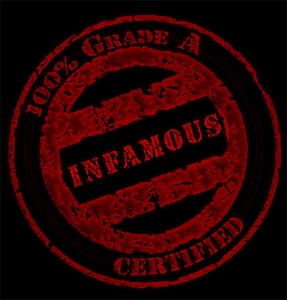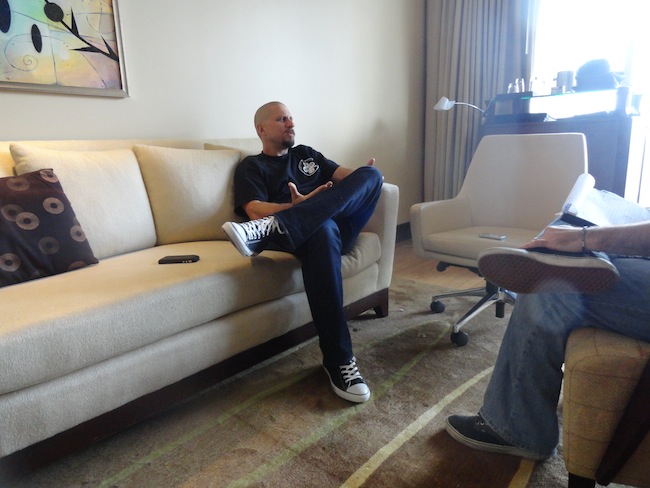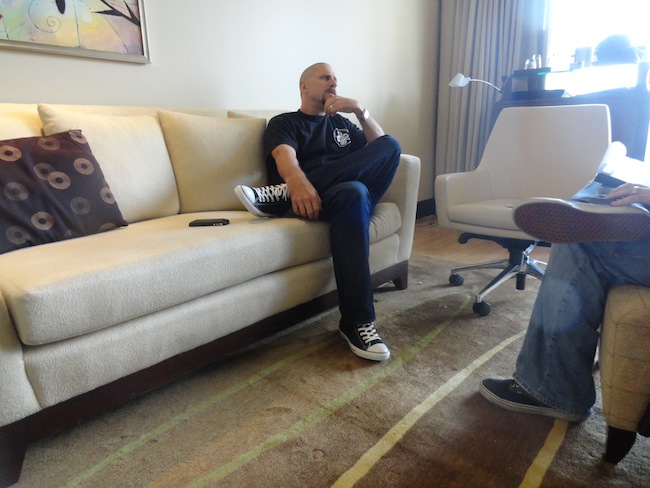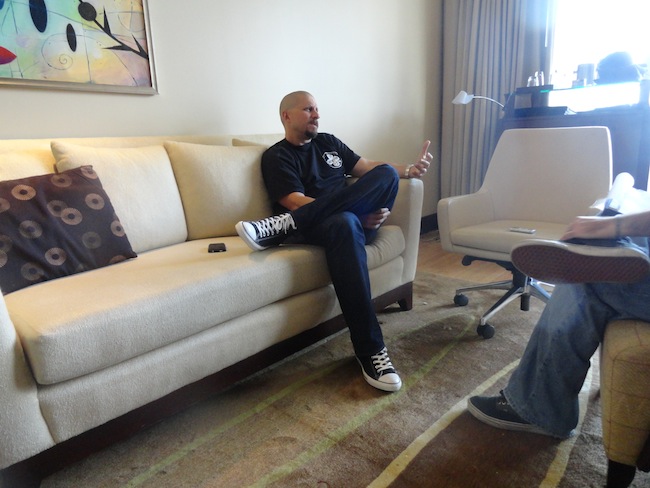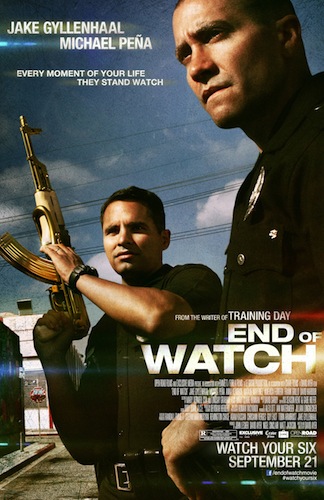
David Ayer has absolutely cornered the market on cop movies, specifically ones dealing with the LAPD. Since arriving on the scene as the screenwriter for U-571 (and a collaboration as a credited writer on THE FAST AND THE FURIOUS), films centered around L.A. law enforcement have been his bread and butter. TRAINING DAY was the first film to put him on the map, as he penned the script that would lead Denzel Washington to an Academy Award for his performance as Detective Alonzo Harris and Ethan Hawke to a nomination of his own for his supporting role. Screenplays for S.W.A.T. and DARK BLUE would follow before Ayer finally jumped behind the camera with HARSH TIMES and STREET KINGS.
Ayer has at least one more cop movie in him with his new film END OF WATCH, which, as a filmmaker, is his best work to date. Telling the tale of a partnership between Officer Brian Taylor (Jake Gyllenhaal) and Officer Mike Zavala (Michael Peña) as they patrol the gang-infested streets of Los Angeles, Ayer has managed to incorporate a found footage/POV-style that keeps you close to the film's events to experience them firsthand as if you were right there with the police in their squad car, on their traffic stops, on their raids, etc., making for a far more intense film.
When David stopped in Miami to talk about END OF WATCH, I had the chance to spend some time talking with him about the movie, particularly his experience with police movies leading up to this one and his process for making a film like this. And, with BREACHER lined up as his next film, just about ready to go into production, we got a chance to talk some Schwarzenegger, too. Enjoy...
The Infamous Billy The Kidd: So let me ask you, because you have a lot of history in doing various aspects of the LAPD with some of your directing and writing starting with TRAINING DAY and going all the way up through STREET KINGS and now here. Over the course of doing all of those films, what led you to want to tell this particular story now?
David Ayer: I wanted to get it right. I wanted to get the genre right and I guess it’s a world I’ve been playing in for years now and I finally feel like I can hang up my jersey and go somewhere else, do something else. A lot of it was I’ve got friends in law enforcement, I’ve got guys that work for LAPD and I was always impressed by the emotional price they paid for that and everyone’s like “Here comes the cops… They’re dicks. They’re giving me a ticket…” and people have that attitude, but they don’t understand the incredible personal sacrifices that anybody in law enforcement makes and at the end of the day it’s on our behalf, right? They told me these stories where they would watch a kid die in front of them, bleed out in front of them and then the next day he’s at home with the family and it’s a neighborhood barbeque and the neighbor who is like some insurance salesman is asking him “Hey man, how was your day at work?” And he described it as like going on military deployment everyday and coming home everyday and cycling between that experience and I wanted to capture that and that partnership, that bond, that friendship that happens between two guys in a cop car and how it can be closer than brothers. I’ve never really seen that shown or if Hollywood does it you’ve got to add the “commercial notes” of “Well, the Hispanic guy should teach the white guy something and they learn something from each other” and I’m like, “No, it’s fucking two bros in a car talking shit and hanging out. Keep it simple.”
The Kidd: You speak to that going out of the squad car when these guys go home and not a lot of films really examine that family aspect and these fears and worries and concerns that come with the job. In doing research I’m sure you talked to many families, does that ever go away or is that something where everyday when they go to work their family fears for their safety?
David Ayer: Everybody has a different strategy. A lot of guys just don’t even tell their wives and family what they are dealing with at work as to minimize the worry. My buddy, Jaime Fitzsimons who was my tactical advisor on this and who is a really good friend of mine… a lot of these incidents in the movie happened to him and they are based on him and his partner back in the day when they worked eight gangs for eight years and he saw the movie. I showed it to him and his wife and his wife was in tears at the end of it and she just kind of looks at him, “That’s what you were doing! You never told me that!” So you could see a lot of history there and again, great personal sacrifice and that’s what we don’t see. We see the professional almost soldierly demeanor of these guys and there’s regular normal people behind that badge.
The Kidd: How early in the process did you decide you were going to go with a POV handheld style? A lot of what you usually see more standard, but this has a very fly on the wall kind of look to it and approach to it, especially… Either you’re using the dashboard cams or just being in a car, it feels like you are becoming a part of that world. So when you were first conceiving this, how early in the process did you decide “That’s the take I want to take on this material.”
David Ayer: Well a friend of mine said “You should write a found footage cop movie” and I’m like “No way… That’s the last thing I should do, another cop movie, because then I’ll be the guy who only does LAPD cop movies” and in thinking about it, I was like “Holy shit, I can say all of this stuff I haven’t figured out how to say and articulate and I can finally get that out there.” So the original conception was actually going to be very found footage and my buddies in law enforcement, some of them wear these little HD cameras on their lapel, just like in the movie, and he started showing me highlight reels from their contacts with the public and wearing these cameras. It was insanely dramatic footage. It’s riveting and has that sort of YouTube feel when you know you’re watching something real and he showed me some dash-cam highlights and I go “This is better than any freaking movie I’ve seen” and so I started out “Okay, well we can make the movie dash cam with the cops wearing cameras and then they are holding a camera that they shoot each other with” and then as the concept evolved I’m like “Why rules? Why do I need to have the camera in someone’s hand? This isn’t BLAIR WITCH. There are no rules” and because it’s an independent movie I could do whatever the fuck I wanted and I had final cut on this. Nobody gave me any script notes. Normally there’s like ten writers and brigades of people giving you on how to cut the movie and “I’m not doing that. So this is me, there’s no rules. I’m going to break genres here” and you get the question of “Well, who is holding the camera?” Who the fuck cares? If you care, I’ve lost you so long ago that you’re not in the movie anyway, so go text someone in the lobby.
The Kidd: I know I talked to Michael about this, but how much leeway did you give them to have this camaraderie between them in the cars? How much was from your head on the page and how much was you like “Okay guys, go at it” to make it feel real?
David Ayer: It’s a weird question, because it was a weird process and it’s hard to explain. There’s a couple of scenes in the movie that you could say are adlibbed, but it’s all based on things that came up in rehearsal and all things that we discovered and experienced together and at the same time there are scenes in there that are word for word right out of the script and you can’t tell the difference between the two.
The Kidd: Nope.
David Ayer: And I’ll ask people and they will pretty much always get them backwards, so there’s something with the chemistry of them that creates this natural subtlety. I mean they don’t like each other at first. They are butting heads and getting them to the point where I could believe these guys are brothers took a lot of work and a lot of training and I’m like watching my movie die in front of me, because they’re not getting along in the first couple months of training and rehearsal. I’m like “Wow, this is a failed experiment right out the gate. I’m going to go write cartoons or something” and something happens, switch flip, and then I couldn’t shut them up. Then I was kind of missing the days when they didn’t like each other. (Laughs) “Stop, you’ve got to work,” but that’s the core of the movie. For me, the best scenes are just them in the car talking shit being dudes.
The Kidd: It gives you a sense of who these guys are and lets you care about them, because you’re getting to know them. It feels like somebody that if you walked outside of the theater, whether they were a cop or not, it feels like somebody that you know, so you can relate to…
David Ayer: You forget they are cops. That’s the thing and that was always my goal, to create these characters that become so real and so well rounded that you forget they are cops and then when you walk out of the theater I’ve had people say “God, I want to go up and hug a cop.” I’m like “You don’t want to do that, but it’s a nice impulse.”
The Kidd: I felt similarly. I saw the movie and then literally the next thing I went to a diner and there was a table full of cops and you still feel weird about approaching them, like if you were to see a serviceman or something you thank them for their service, but for a cop…
David Ayer: Nobody does that with cops and that’s the thing, that’s what I hope can change a little bit of the perception of law enforcement. You run into a cop in public and you talk to them and there’s always that moment of like “Ah, hey they are talking to me” and then they are cool. They’re just people.
The Kidd: “I don’t want them to think that I’m doing something wrong by talking to them.”
David Ayer: “I’m going to take his gun and rob this place. No, no it’s cool; I like you, sir.”
The Kidd: There’s a really strong powerful scene with Frank Grillo as a sergeant where he’s talking… it’s a very subtle scene, but where he’s talking about what these guys ultimately mean to each other and that these are men and women who would lay down their life for each other in a second, like without even thinking about it. Was that scene just your way of tying it together without banging people over the head with it?
David Ayer: The way I see it is these people are part of a machine and with or without them, the machine is going on and more people are going to enter the machinery and more people are going to leave the machinery either by retirement or death, and it’s that history and legacy and that Jake’s character of Brian Taylor is going to be the Sarge one day talking about the partner that took the bullet for him and how he would have rather died… The very first draft I wrote, both of the guys died and I even shot the funerals, so I had both versions and it’s that thing of like… it would have just been too scorched earth. It’s like the avant garde, BUTCH AND SUNDANCE and then it’s like “Well what am I really saying?” If you talked to cops, to a man, to a woman, they all say the worst thing they can experience is the death of a partner and if they died, both of them, it lets Jake off of the hook in a sense and lets the audience off the hook and then we’d lose that understanding of the aftermath and it still goes on and you’ve still got to put the uniform on. Yeah, it’s a good way to end…
The Kidd: How difficult is it to build tension in a film like this, where by the nature of what they are doing there is tension in every scene, because at every point if they are doing a traffic stop or there’s danger to… How difficult is it to build that tension throughout this arc that you want to tell while not having the audience so locked in where they are not following them?
David Ayer: Well it’s structure. You do it in writing a little bit, but scripts are highly imperfect and at that end of the day scripts can only be notional in my mind. It’s very close to the script, but it’s also changed and in any good drama… it’s like the symbol for drama is happy mask sad mask, it’s not two sad masks, so it’s throttling between the joy and the humor and the fun in a way the light adds to the contrast of the darkness, you know? You can get a little darker and explore that further if you have the light and the good and at the end of the day that’s where the directing things comes in or as a friend of mine would say “You do your director shit.” In that environment you’ve got gangbangers with body armor and automatic weaponry, choppers right, so it’s like full automatic fucking AK-47. An AK-47 will punch through a cop car, both cops inside, and their trauma plates, so there’s inherent danger in any situation, like my cop buddy got ambushed. They would phone in help calls… They would call 9-1-1 to draw the cops into an alley and put washing machines and then throw down a refrigerator so the car can’t back out and then just shoot them up from both directions, so it’s a little bit like war. So the danger is always there, portraying it on film is all about the actors, so these guys had the real training and so even just a simple vehicle stop in south central is this tactical dance and I think the audience may not understand what exactly they are seeing if they aren’t familiar with that world, but they know that they are seeing something real and they know that this is for a reason. I really trust the audience to fill in the blanks.
The Kidd: Let me ask you about BREACHER. You’re getting ready to start shooting in a few weeks?
David Ayer: Five weeks, dude. October 15th.
The Kidd: How are things shaping up with how that project is going forward and watching the cast being assembled? What are your thoughts on working with Schwarzenegger at this point in his career?
David Ayer: I think it’s a freaking honor. I mean I grew up on his movies and there’s a bit of that thing of like “Okay, wait a second. So this guy was a huge movie star when I was growing up… I loved his movies.” I went and got a flat top after I saw PREDATOR, you know. So it’s like… And he’s a former governor of the state of California and amazing life history. He bootstrapped himself up, came to this country with nothing… Everything he has, he’s earned and so… Even a high school drop out… So I really respect him as a man and then to be able to work with him professionally is like “Wow, it’s an honor.” Especially since he’s letting me reinvent him, so change his appearance. I’m going to put tattoos on him. He’s going to have like a tattoo on his neck and let him go gray, cut his hair… He’s going to play like a real guy, a bad dude. I’m not doing an action movie here, I’m doing a David Ayer movie. I’m doing what I do good and I’ve got this fantastic cast I’m putting around him with Sam Worthington, Josh Holloway, Joe Manganiello… I mean it’s this unbelievable cast. I mean these dudes look badass and I am back to the corruption piece, but this movie is the same thing; I’ve got the creative control, no one is coming in and telling me what to do or what not to do, so the trust… To be able to go into an Arnold movie and get final cut in this world today doesn’t fucking happen, dude. It doesn’t happen.
The Kidd: Just notes and execs and studios telling you this, this, and that where you have to follow a structure… “We need this point….” But let me ask you one other Schwarzenegger question which deals with COMMANDO which you wrote and I know you have been attached to direct for a couple of years. What is the status of where COMMANDO is at? Beyond that, why the decision to remake in someway a Schwarzenegger film?
David Ayer: I love COMMANDO. I thought it was a great movie and it’s so simple in its essence. TAKEN was kind of a conversion of COMMANDO, you know? At the end of the day… It’s like, “Let’s go to the original.” It’s a story I think that’s very simple and primal and that was set up at Fox and I did a draft and I did a rewrite on SCARFACE recently; they’re going to reboot that at Universal. So it’s like, we remake movies. (Laughs) Having said that, I’m going to make some original movies and create some new eyepieces.
The Kidd: Thank you very much, I appreciate it.
David Ayer: Thank you, brother.
END OF WATCH opens in theatres this Friday, September 21.
-Billy Donnelly
"The Infamous Billy The Kidd"
Follow me on Twitter.
